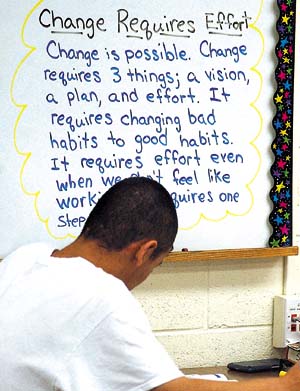For some students, the best educational experiences can be found
in the only San Benito County school that nobody wants to
attend
– juvenile hall.
Hollister – For some students, the best educational experiences can be found in the only San Benito County school that nobody wants to attend – juvenile hall.
Denise, 17, has been in and out of juvenile hall 10 times over the last year for a variety of crimes related to her methamphetamine use, but in less than six months she will graduate from high school – thanks in large part to the facility’s individualized educational program.
“This school helps me because there are less people and I can work at my own pace,” she said. “Other schools have too many students – in a bigger classroom you’re just one in too many.”
Denise isn’t happy to be in juvenile hall and hates being away from her friends and family or missing her high school prom, but she has learned from the experience.
“I don’t like it, but once you come here so many times, you get used to it. It’s not good to say, but (juvenile hall) is kind of like a second home for me,” she said. “It took me 10 times to learn that I have to stop doing this drug.”
Denise is proud of her academic accomplishments, and justifiably so. At one point, she had so few credits that graduation didn’t even seem possible. But on Friday, hard at work on her last few credits, she can see a much brighter future for herself. She plans to stay away from meth, graduate from Pinnacles Community School and go to cosmetology school.
“It’s been my passion,” she said. “And I’m tired of practicing on my own hair.”
County Superintendent of Schools Tim Foley, who oversees juvenile hall education, believes that these students need a break from cell phones, drugs, television and friends in order to get serious about their education.
“After they have been here for a while they relax,” he said. “This is a real opportunity for intervention. Their defenses are down – you can actually break through.”
Many of the school’s students only stay at juvenile hall for a few days or a few months, said Mike Sanchez, director of the county’s four alternative schools. However, it is important to get the students back on track academically because many have missed months, or even years of school.
“Once they get here,” he said, “they are going to be in school.”
The key to successful education in juvenile hall is personal attention, Sanchez said.
“We give them a bridge back to their last school,” he said. “We create individualized programs so they can go right back and stay on track.”
When they leave juvenile hall, most of the students enroll in an alternative education program such as Pinnacles Community School or San Andreas Continuation High School. But those at juvenile hall for less than 10 days are able to return to San Benito High School or Hollister School District, Sanchez said.
Another factor in the school’s success involves motivation, Juvenile Hall Superintendent Tim Pierleoni said.
“There is definitely a motivation factor – they are motivated to change,” he said. “They realize that their teachers are there to make sure their schooling isn’t lost and the (students) welcome that.”
Motivation also comes from the fact that if students refuse to go to class, they have to spend the entire day in their cell, he said.
Juvenile hall students learn not only from textbooks and teachers, but also from probation staff, said Gabe, who recently turned 18 and has been locked up 20 times for theft and methamphetamine use. For several days during his initial stay, Gabe was referred to as “Mr. Rude” because of his self-centered attitude. At that time, Gabe only did what he wanted to and wouldn’t take direction from anyone.
“I learned a lot of respect here,” he said. “Eventually I got attached to the staff and I learned that I couldn’t be like that.”
Gabe has developed new goals for a much more productive future – he knows he doesn’t want to end up in jail.
“After my sentence is up I’m going to go to (drug) rehab,” he said. “I’m 18 and I need to get my (stuff) together.”
After drug treatment, Gabe hopes to go to college and become a professional photographer. And after college, the sky is the limit. He plans to work with the paparazzi for a couple of years before landing his dream job as a photographer for National Geographic.
Brett Rowland covers education for the Free Lance. He can be reached at 831-637-5566 ext. 330 or [email protected].









